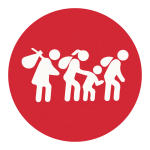Kasai Humanitarian Response
Changing the paradigm of how primary health care needs are met in a crisis situation.Providing food security and health care during the crisis in the kasai
When fighting broke out in the Kasai region of DRC leaving 1.4 million internally displaced persons, or IDPs, years of development work were at risk of being undone in an instant. IMA and its partners had dedicated four years to strengthening and supporting the health system in Kasai and Kasai Central provinces through the Access to Primary Health Care program, known locally as ASSP. One of the largest concerns was the influx of humanitarian organizations creating parallel health service delivery systems that would provide short term care in temporary health structures run by foreign health workers, leaving the web of local workers and structures to decay for lack of use.
The first phase of IMA’s humanitarian response, Health Care Services for the Vulnerable Populations and Internally Displaced Persons in the Kasai, took place from September 1, 2017 to June 15, 2018. The program targeted 16 health zones experiencing 25 percent or more of population displacement for an estimated target population of 1,689,561, including approximately 1,309,850 IDPs. Phase two, the Greater Kasai Health Care and Food Security Recovery Plan, began in July of 2018 and received two no cost extensions which propelled the program through March of 2020.

1,960,221
The number of outpatient consultations that were faciliated over the course of both phases of the humanitarian response.
Our Approach to Crisis Response
IMA, in partnership with the Office of U.S. Foreign Disaster Assistance and implementing partner, Sanru, sought to change the paradigm of meeting primary health care needs in a crisis situation by building off the foundation that was constructed through its development work and elevating support for the health system that was already in place. This was done by reimbursing health centers for patient fees and providing primary health care service free of charge at local community health centers, allowing local health workers to continue receiving salaries and health centers to keep functioning. This will also allow for a seamless transition back to normal functioning once the crisis has ended.

36,428 kgs of corn

40,954.5 kgs of peanut

children less than one vaccinated against measles
KEY ACHIEVEMENTS
111 tons of SENAMEN certified high-quality seeds distributed
Agricultural tools including, hoes and shovels, and hermetic bags for safe seed storage were also distributed to targeted beneficiaries.

health facilities received free services

38,704.75 kgs of cowpea

293 kgs of amaranth

mothers and newborns received postnatal care within three days of delivery

farming households
experienced an increase in food production capacity, consequently improving the food security status of 72,000 people.ings.
Increasing Access to Health Care
Read more about how ASSP is contributing to improved health by increasing access to health care.
read more about our work to alleviate suffering in the greater kasai region
Publications

Humanitarian Response
Health Care Services for Vulnerable Populations and Internally Displaced Persons – September 2019 (English version) (version française)
In the Kasai crisis response, a priority on local health services – June 2018 (news article)
QUICK CONTACTS
Recent Posts
DRC Malaria Team Witnesses Firsthand the Devastating Effects of the Disease
The IMA DRC Malaria Team is having great success with their hang up in West Kasai. So far the team has completed two zones, Kitangua and Banga, for a total of 89,600 bed nets donated by the Against Malaria Foundation. The team has now moved on to Kamonia Health Zone,...
Improving Health in DR Congo, Brick by Brick
The health center is a central feature of the health care system in DR Congo. While each health zone has a large referral hospital where more serious cases are referred, the smaller health centers, scattered among the villages, are where the day-to-day primary health...
Community Core Groups: A Promising Platform for Integrated Development
The USAID-funded Project Ushindi has lived up to its name by helping thousands of women overcome sexual and gender based violence in the eastern Democratic Republic of Congo. Ushindi means “to overcome” in Swahili and speaks to the goal of the project. Based in 10...


